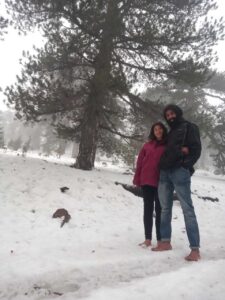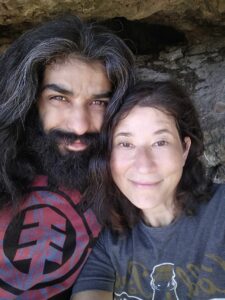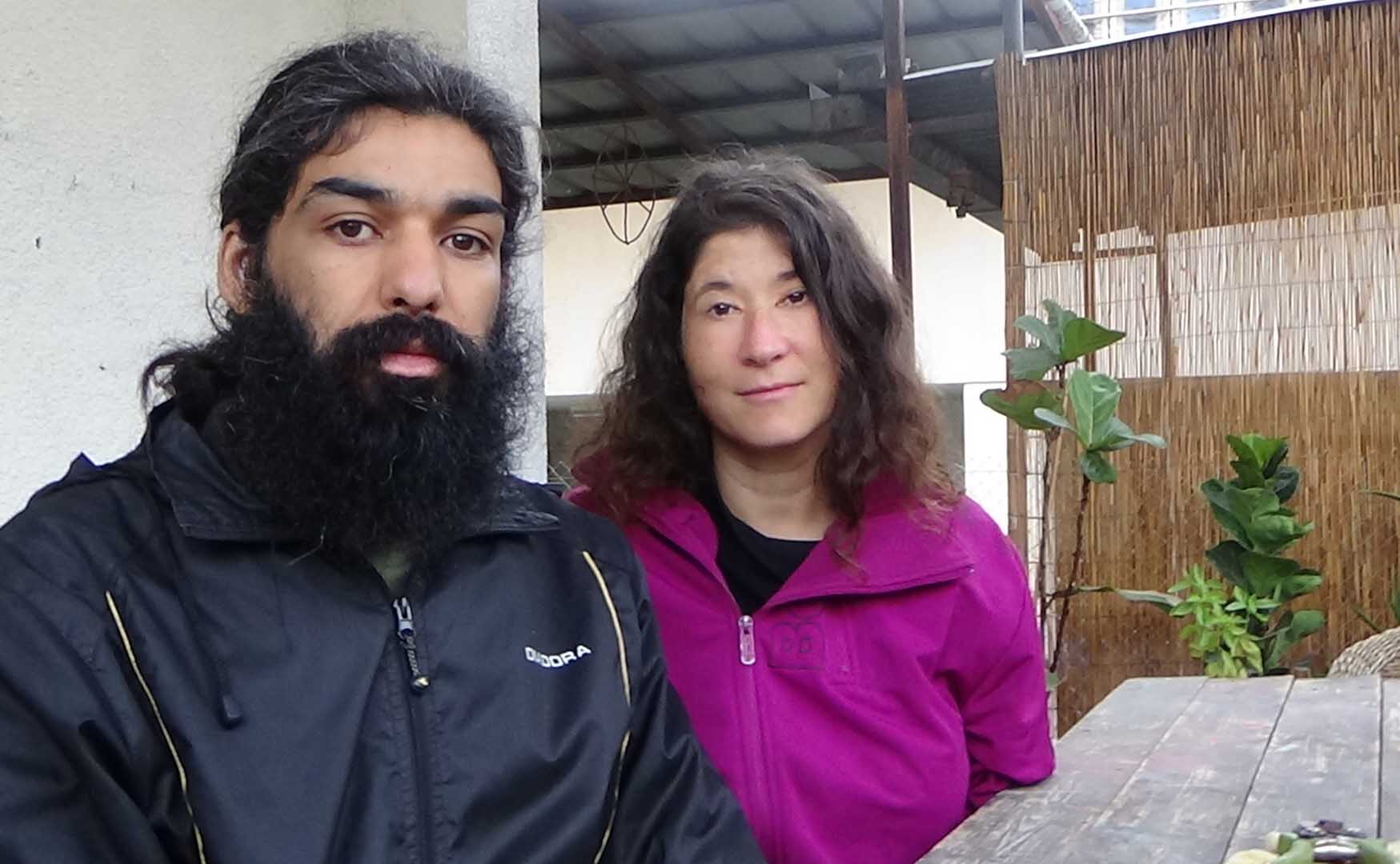For nearly three years, an Iranian-Israeli couple were homeless and reduced to eating lizards before Cyprus finally granted them refugee status. Following your heart comes at a price they tell THEO PANAYIDES
The first time I see Lital Ben Haim and Vinas (surname not supplied) it’s at the old City Plaza in Nicosia, selling dreamcatchers and other handicrafts in a pop-up shop for a few weeks over Christmas. The second time – by accident – is a couple of days later, walking down Makarios Avenue in their bare feet (they go barefoot everywhere; it’s part of their lifestyle). The third time is about a week later, in a borrowed house where they’re staying for a while – taking care of a friend’s cats while the pop-up is open – before heading back to their state-supplied accommodation in the village of Galata. We sit in the garden while a rainstorm rages, sipping hot water with lavender, lemon and ginger, as I listen to a story they’ve narrated many times before.
Vinas and Lital are practically celebrities. They’ve given interviews to media outlets in various countries (notably Newsweek in August 2020) and a documentary about their plight – Asylum: Love Has No Borders – recently won a prize at the Human Rights Film Festival in Madrid. That said, Lital looks thoughtful when I mention their renown – and insists that they find themselves, even now, in an “in-between situation”.
She’s 38, he’s 33. She’s chattier (her English is better) and seems more detail-oriented, more of an organiser; his energy appears more serene, dreamier, with a bushy beard and a conspiratorial smile that makes his whole face crinkle. The preference for going barefoot originated with him, unsurprisingly. “When I met Vinas we met in a forest, in a camping place,” she recalls. He was barefoot, which was normal enough in that context – “but then he told me he’d already been barefoot for two years… When I changed to going barefoot, I think the main reason was to understand Vinas better – and I enjoyed it”.
“The reason that I started to be barefoot was just because I feel more comfortable, and I feel good,” he puts in. You have to be a little more careful when not wearing shoes, so “I learned to go slow, and with more consciousness… It slows me down, and I don’t rush a lot now. I go more peaceful.”
Being barefoot isn’t really such a big part of their story – but it made a difference, when they tried to register at the Labour Office for instance… But we’re getting ahead of ourselves. I ask about their respective personalities, and Lital shrugs: they’re similar in most ways – both love Nature and the outdoors; both are involved in traditional art and music – and their differences have diminished in the past three years, “with all the experiences that we’ve been through”. One difference remains inescapable, however, and vitally important – not to them, but to the world. Lital is from Israel, Vinas from Iran.
This wasn’t an issue when they met, in the spring of 2018, at a ‘Peace in the Middle East’ camping event in Turkey. “It was very natural when we met each other,” recalls Vinas. “We just became connected, without any question, without thinking.” He’d left Iran in 2015, to study classical harp in Armenia and do some travelling “but not as a tourist”. She’d grown up in the small town of Ramat Yishay, spent a few years as a dental hygienist but found both her working conditions and life in Israel extremely stressful. (“Israel is not a peaceful country,” she sighs, speaking both of its various political conflicts and systemic pressures in society itself; working hours are long, the cost of living extremely high.) “I was young, I was 20-something, and I was stressed. And I made a decision not to be stressed anymore.” She switched to traditional crafts, and became something of a “travelling artist”.
Lital and Vinas did indeed travel for a while after meeting in Turkey, just “enjoying each other’s presence” as she puts it. Their life together has three acts – and Act 1 was the most carefree, albeit increasingly worrisome. After a couple of months, two things became apparent. One was that they were in a serious, long-term relationship and would probably spend the rest of their lives together – and the other was that their tourist visas were running out, “and we started to understand that our travelling options together, holding an Iranian passport and an Israeli passport, were very limited”.
Neither country would accept them, of course; Iran won’t even take travellers with an Israeli stamp in their passport, let alone an actual Israeli. As for Lital’s home country, “the government is keeping people in fear of the nuclear threat of Iran”, so a cuddly bicommunal relationship wouldn’t exactly be good PR. Having Vinas convert to Judaism was near-impossible (“It’s a very exclusive club,” she chuckles dryly) – and in any case, “both of us live a religious-free lifestyle… We have no interest in acquiring a new religion”. The couple spent a few months wandering around Turkey and the Caucasus, staying in each country till their visa expired. In early 2019, they were again “between visas” and had to spend 90 days outside Turkey, so they opted to come to the occupied north – but then, “when we came to North Cyprus with the ferryboat, they gave me a 90-day visa and they gave Vinas a 30-day visa… We understood that we now have a big problem.”
It was indeed a problem. They couldn’t go back to Turkey till three months had passed – but where else could they go, once Vinas’ visa had expired? “We tried to argue, but it didn’t work.” Feeling increasingly trapped, they sought help (in vain) from the UN. “We ended up at Ledra Palace [checkpoint],” she recalls – “and, in a very spontaneous decision, we crossed here and applied for asylum at the border”.
What were they expecting?
“We were expecting to find a solution,” she replies – then sighs, shaking her head at the recollection: “It all became a mess when we came here”.
Thus began their second act – actually the part of the story that has least to do with their status as a mixed couple, a cautionary tale that could happen to any migrant. “We did like all asylum seekers, we made an application to the Welfare,” says Lital, picking up the thread. They received a little food money, not enough for rent or a place to stay. The couple had been camping for months anyway, so they pitched their tent – temporarily, they thought – on the bed of the Pedieos river in Strovolos.
The system requires asylum seekers to register with the Labour Office, after which they become eligible for rent money and a monthly food allowance; however, “when we went to register, they refused registration to us. They said that, because we are homeless, it will be hard for us to get a job. And because we were barefoot…” She trails off, shrugging; I assume they must’ve been quite a sight, a hippy-looking couple smelling of the river. Labour promised to get in touch with Welfare, to ask them to make an exception; Welfare, however, refused to do so. It was an impasse – and there it stayed for an astonishing 10 months.

What about taking a shower?
“We barely –“ begins Vinas.
“We generally didn’t shower,” says Lital. “There was one organisation in the city centre at the time that was serving asylum seekers, and they had a shower. I showered there, very irregularly.”
Laundry?
“In the small sink of the public toilet in the park.”
Lital’s family helped a bit. Strangers sometimes gave a little money. Malnutrition was by far the biggest issue. “We were scavenging, we were eating scraps from the Ochi market. We went twice a week, collecting fruits and vegetables that were left at the market floor at the end of the day.” For protein, she admits rather shamefacedly, they’d hunt what they could, even lizards. Place your leftover fruit in a pile, she instructs; this attracts flies, and the flies attract lizards – then you hover over the pile with a stick, choosing your moment. At one point, “the river flooded on us; we almost died on the river”. A flash flood inundated their camp, sweeping away most of their belongings.
It seems extraordinary that an educated, English-speaking young couple could be reduced to such penury, in an EU country; still, there it is. Finally, she says, in November 2019, “we were staying in our latest homelessness place, neighbours were complaining, and police came to clear us out”. It turned out to be a blessing in disguise; at the station, “we spoke with a very kind police officer – for the first time, someone listened to all our story! – and he called on our behalf all the offices that rejected us until that point”.
Almost immediately, government housing was arranged for them in the mountain village of Pedoulas (the later move to Galata came three months ago); a cautionary tale in itself, in that all it took was a phone call from the right person, though in fact this wasn’t the happy Hollywood ending it sounds like. They had shelter in Pedoulas, but still no money. They were eating badly, dry goods and whatever wild greens they could forage, and also felt isolated, “stuck on the mountain” with a pandemic now raging – and there was something else too, a psychological sense of having sacrificed their freedom to become a charity case. “My spirit was down,” admits Vinas.

“It helped us become more bonded,” smiles Vinas.
“Obviously it made us stronger, and I think we’re [now] at a level of – like, already 50 years’ relationship, you can say!” she adds with a laugh. “It’s not lovely all the time… But it’s very beneficial. We do so much.”
Probably true; yet in fact the most notable (and slightly surprising) thing about Lital Ben Haim and Vinas may be how ordinary they are, despite their celebrity. They were never radical, or anti-government. They didn’t fall in love as a grand political statement, nor are they given to deep metaphysical soul-searching. “I’m not spiritual,” says Vinas at once, when I broach the subject. They’re people who enjoy slow, simple pleasures: being in Nature, playing music, making things with their hands, walking barefoot. “We like to be outside,” says Lital (somewhat ironically, given their 10 months of homelessness). “We’re fascinated by the lifestyle of people before civilisation, when humans were hunters and gatherers.” They’d like to live in the countryside – whether in Cyprus or elsewhere – maybe start a family. They don’t especially want any more documentaries to be made about them.
That’s in the future, of course – and right now, as already mentioned, is something of an “in-between situation”. In October, after two years and nine months, Lital and Vinas were finally recognised as refugees – but they still don’t have a residency card that’ll allow them to work and travel. Their application is due to be submitted this month, hopefully to be processed in weeks rather than years; meanwhile, they combine a modest lifestyle with updating social media and replying to followers all over the world. She’s often contacted by other mixed couples, says Lital, “hidden stories, persecuted people,” couples – like themselves – who found their simple wish to be together stymied by politics or bureaucracy.
All this happened naturally, inexorably. Two people met, fell in love, didn’t even realise their love might be something objectionable. They just want to do their own thing, shrugs Lital – yet she’d still like to “find a voice” for those other couples, to set an example; the fact that she and Vinas aren’t political is also, paradoxically, what makes them political. “We are the peacemakers,” she points out with meaning. “The people that are following their heart against all odds”. It led them here, today, to a rainy day in a brand new country and a house full of cats.
Future of love video:
Facebook:
https://facebook.com/supportstatelessfamily
Instagram:
https://instagram.com/supportstatelessfamily







Click here to change your cookie preferences